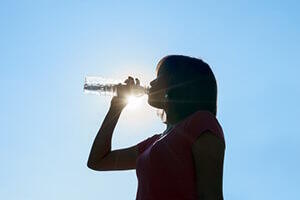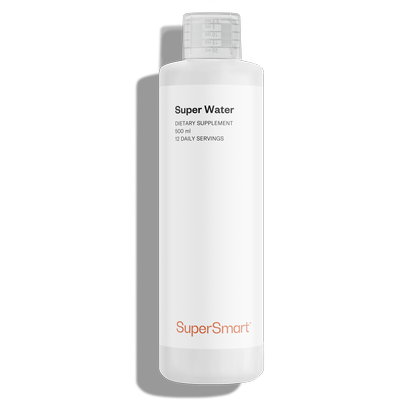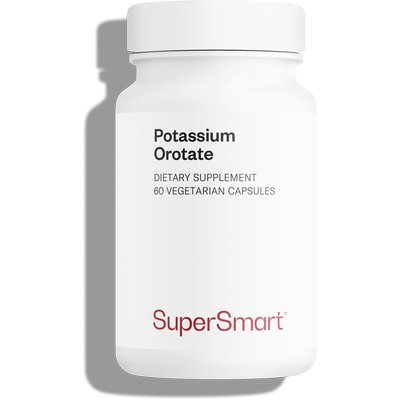26-06-2019
Heatwave alert: why focus on sodium?
 It’s official – in recent days, many regions of the world have seen record-breaking temperatures, prompting heatwave health alerts in a number of countries. In response to this premature spell of sweltering heat, health authorities have increased their warnings, reiterating advice on what to do in exceptionally hot weather1,2. As well as avoiding over-exposure to the sun and heat, it’s vital to drink plenty of water to prevent dehydration. In this context, drinking salt water can be beneficial3. Read on to find out how sodium can be a valuable ally in helping you cope with the soaring temperatures!
It’s official – in recent days, many regions of the world have seen record-breaking temperatures, prompting heatwave health alerts in a number of countries. In response to this premature spell of sweltering heat, health authorities have increased their warnings, reiterating advice on what to do in exceptionally hot weather1,2. As well as avoiding over-exposure to the sun and heat, it’s vital to drink plenty of water to prevent dehydration. In this context, drinking salt water can be beneficial3. Read on to find out how sodium can be a valuable ally in helping you cope with the soaring temperatures!
How sodium helps the body retain water
Ideally, you shouldn’t wait until you’re thirsty before having a drink. This warning mechanism comes too late - it sounds the alarm when the body is already 3% dehydrated.3. Water is essential in order for the body to function properly. Did you know, for example, that the body is made up of 65% water?4. To maintain this water content, the body has to preserve a balance between water eliminated through perspiration and urine, and water provided by the diet and hydration. It is here, in maintaining this balance, that sodium plays a role. Controlling the body’s water content is actually highly dependent on the ratio of sodium to potassium. Potassium encourages elimination of excess water by the kidneys, while sodium is essential for retaining it. By reducing the amount of water lost, sodium thus helps prevent and counter dehydration.
Sodium for reducing the risk of dehydration
The key role sodium plays in enabling the body to retain water makes it very important during a heatwave when dehydration becomes much more of a risk. Symptoms of dehydration include intense thirst, headache, weakness, nausea and vomiting. In more serious cases, it can result in illness. These symptoms are caused by poor hydration of the body’s organs and inadequate control of body temperature.
Sodium for regulating body temperature
In peak temperatures, body heat is regulated primarily by passive heat loss through the skin, and by active heat loss via evaporation of sweat5
Significant loss of sodium in very high temperatures
Although perspiration prevents a rise in body heat, it greatly contributes to the water lost during periods of very hot weather. At normal temperatures, sweat evaporation accounts for 20% of the body’s cooling process, but when the mercury rises, this figure can increase to 75%1 which is why we need to increase our intake of fluids during hot spells. What’s more, sodium – like water - evaporates, and lower levels of sodium mean the body retains water less efficiently.
Risk of sodium deficiency during a heatwave
We tend to hear much more about the risks of too much, rather than too little, sodium. Known as hyponatraemia, low sodium levels are often characterised by a distaste for water which significantly increases the risk of dehydration. While the risk of sodium deficiency in developed societies is low, it can increase under certain conditions – notably during a heatwave. A lack of sodium can by caused by ill-advised or overly-strict salt-free diets, or by vomiting, diarrhoea or taking diuretics. Hyponatremia is also quite common among the elderly which affects their sensation of thirst. Perception of heat and ability to perspire also alter with age which is why older people are considered to be at greater risk during a heatwave.
Benefits of sodium supplementation during very hot weather
Given that sodium plays a key role in enabling the body to retain water, and that high temperatures cause its evaporation, supplementation may prove beneficial in preventing dehydration. This is why drinking salt water is sometimes recommended during a heatwave. Either by adding a little salt to water or by consuming isotonic, salt-enriched drinks³. The latter are often a better choice as they provide a reasonable ‘dose’ of sodium and prevent excessive intake. One such product is SuperWater, available from the SuperSmart catalogue, which contains 98-98.5% water, 0.5-1% sodium hydroxide and 1% sodium chloride. This alkaline water is particularly popular with sports enthusiasts for preventing dehydration and optimising body function. Indeed, as well as facilitating water retention in the body, sodium is involved in regulating blood pressure, in muscle contraction and in nerve signal transmission.
Contrary to popular belief, sodium can be a friend rather than foe, in helping the body to retain water. In moderation, it can be beneficial during periods of hot weather and intensive exercise. To counter sodium evaporation and prevent potential deficiency, sodium supplementation at reasonable levels may therefore be advisable. One way of increasing your sodium intake is by choosing salt-enriched drinks such as SuperWater. Notwithstanding the benefits of sodium during a heatwave, other minerals such as potassium are also important. Like sodium, potassium helps maintain the body’s acid-base balance and is also available as a dietary supplement in its most absorbable form: potassium orotate.
> Sources :
1. Santé publique France, Fortes chaleurs - prévenir les risques sanitaires chez la personne âgée, mars 2015 : http://inpes.santepubliquefrance.fr/CFESBases/catalogue/pdf/1033.pdf -Consulté le 22/06/2017
2. OMS, Traitement initial de la déshydratation en cas de malnutrition aiguë sévère, avril 2011 : http://www.who.int/elena/titles/bbc/dehydration_sam/fr/ - Consulté le 22/06/2017
3. J. Camuzard, Canicule : pourquoi le sel peut être un bon allié contre la déshydratation, Le Figaro, Juillet 2016 : http://sante.lefigaro.fr/actualite/2016/07/29/25254-sel-allie-contre-deshydratation - Consulté le 22/06/2017
4. CNRS, L’eau dans l’organisme : http://www.cnrs.fr/cw/dossiers/doseau/decouv/usages/eauOrga.html - Consulté le 22/06/2017
5. Lavallart B., Bourdon L., Gonthier R., Dab W. Pathologies consécutives à une exposition prolongée à la chaleur. Rev. Prat. 2004 ; 54 : 1298-304.
Order the nutrients mentioned in this article

Increases ATP levels – Optimises cell function – Restores acid-base balance
www.supersmart.comFurther reading
13-02-2017
If you’re wondering about the benefits of zinc or how effective it is, a study published in The American Journal of Clinical Nutrition in 2016...
Read more29-07-2019
Magnesium has until now been mainly known as an essential mineral for nervous system balance, cardiovascular regulation, muscle function and bone health. Now it seems...
Read more30-04-2018
A newly-published study in The Journal of the American Osteopathic Association shows that the body may be unable to make proper use of vitamin D...
Read more© 1997-2025 Fondation pour le Libre Choix
All rights reserved
All rights reserved
Free
Thank you for visiting our site. Before you go
REGISTER WITHClub SuperSmart
And take advantage
of exclusive benefits:
of exclusive benefits:
- Free: our weekly science-based newsletter "Nutranews"
- Special offers for club members only


















